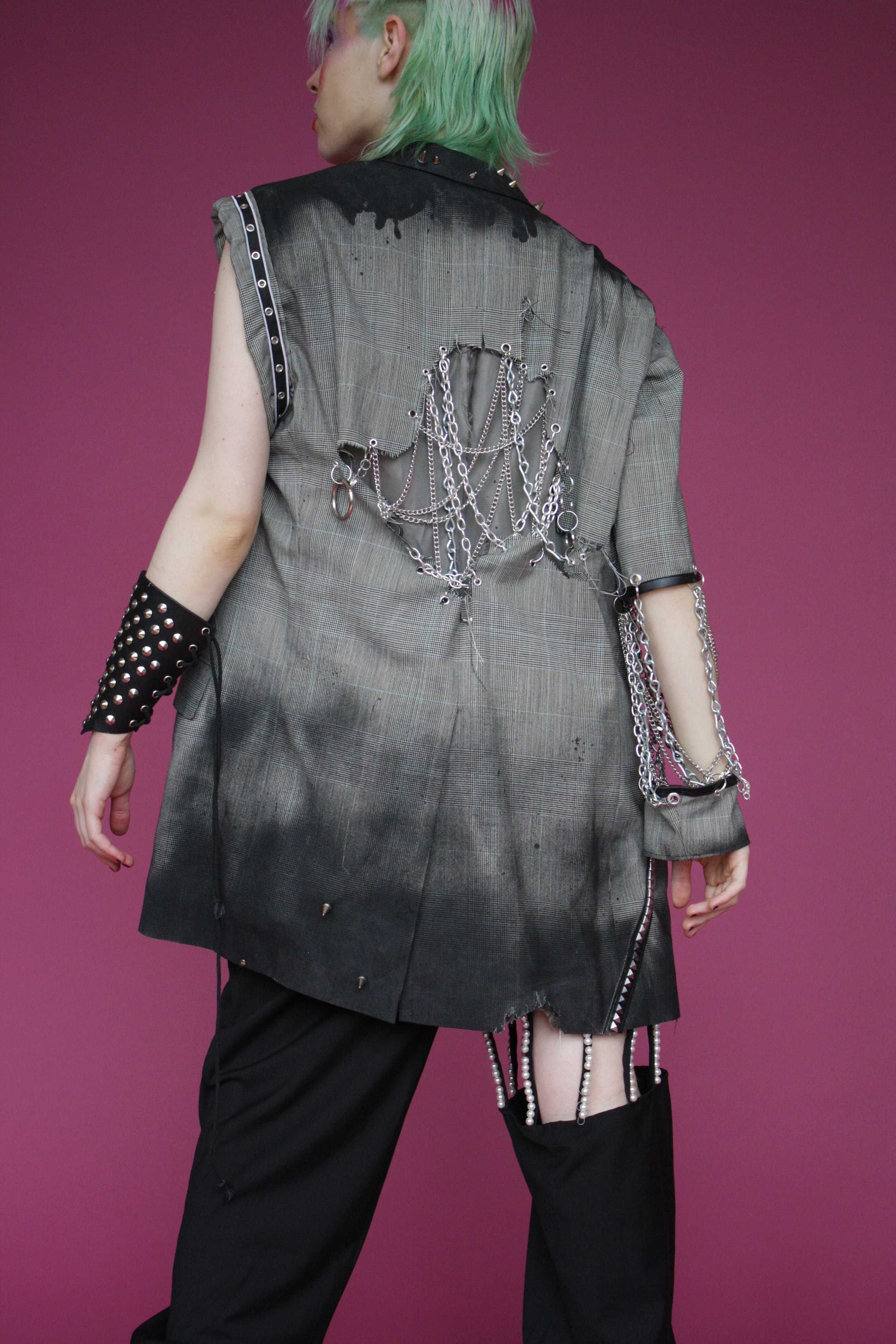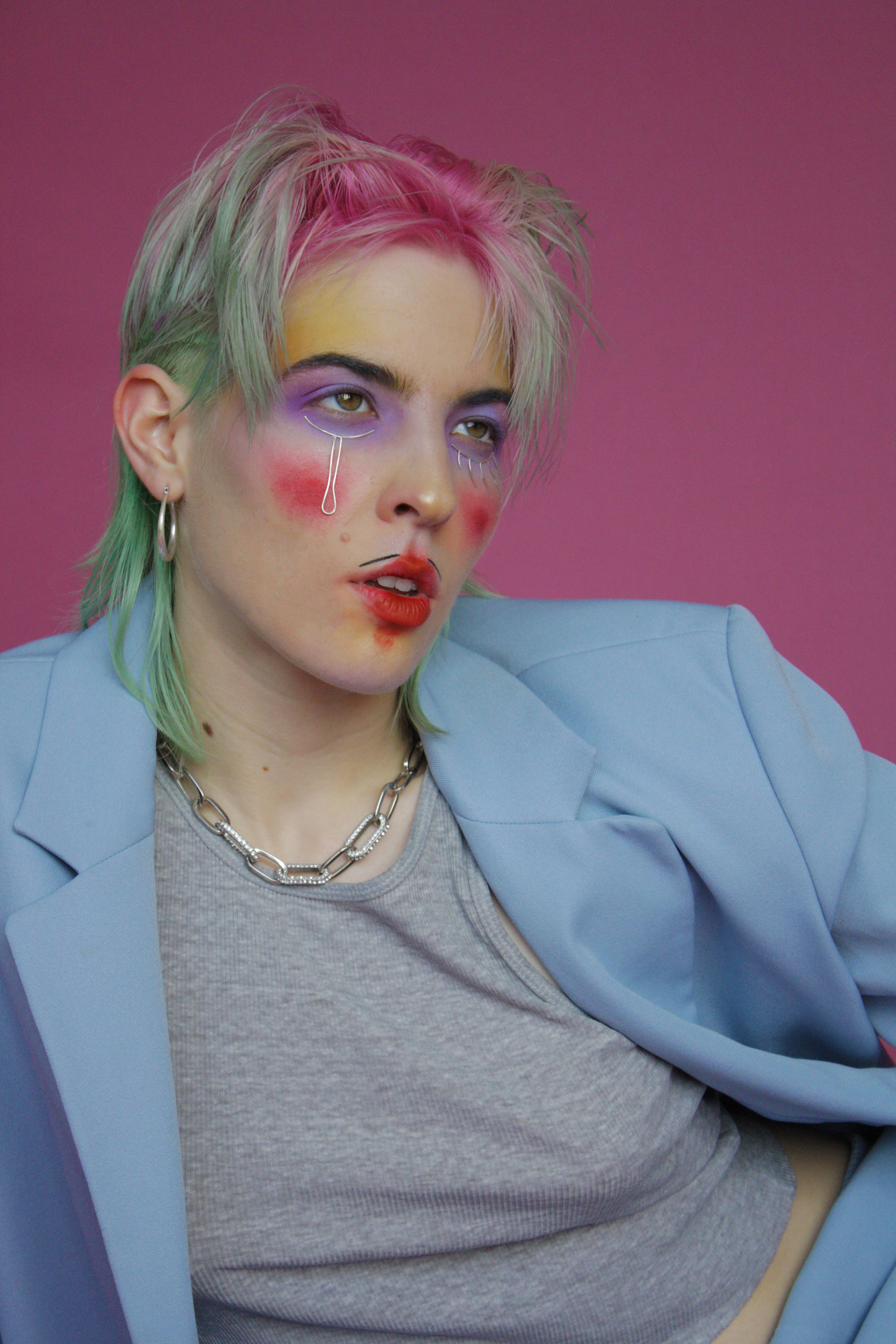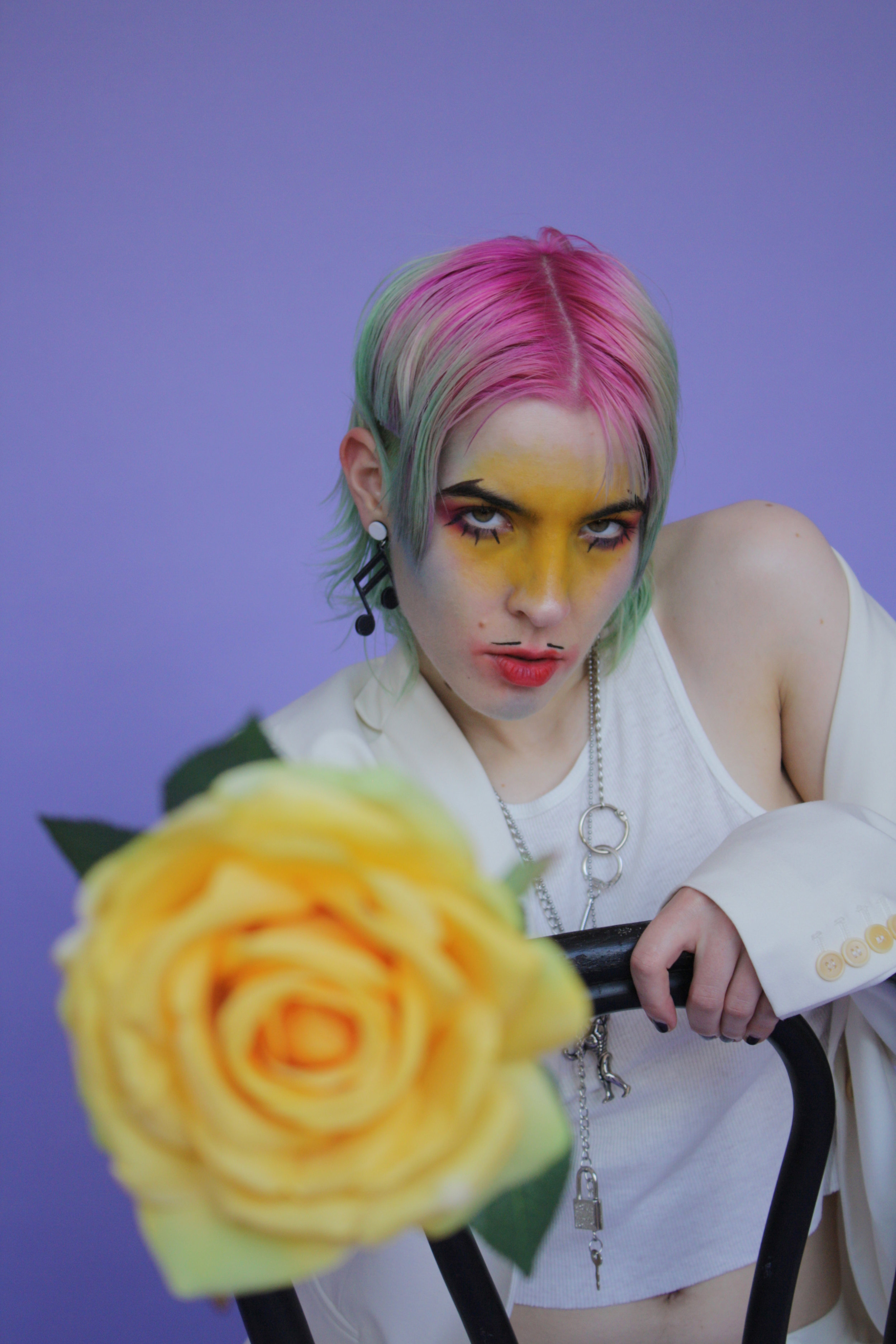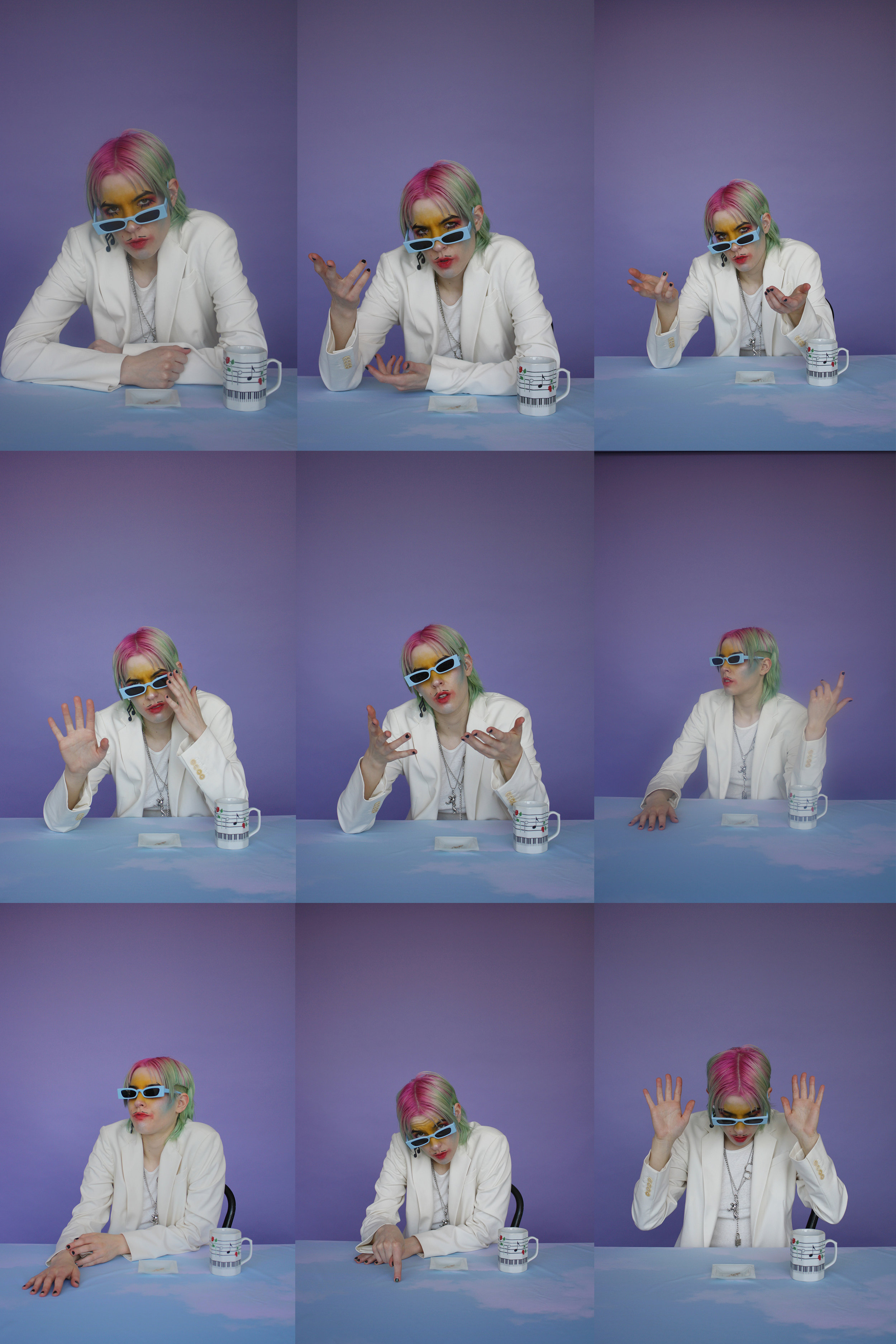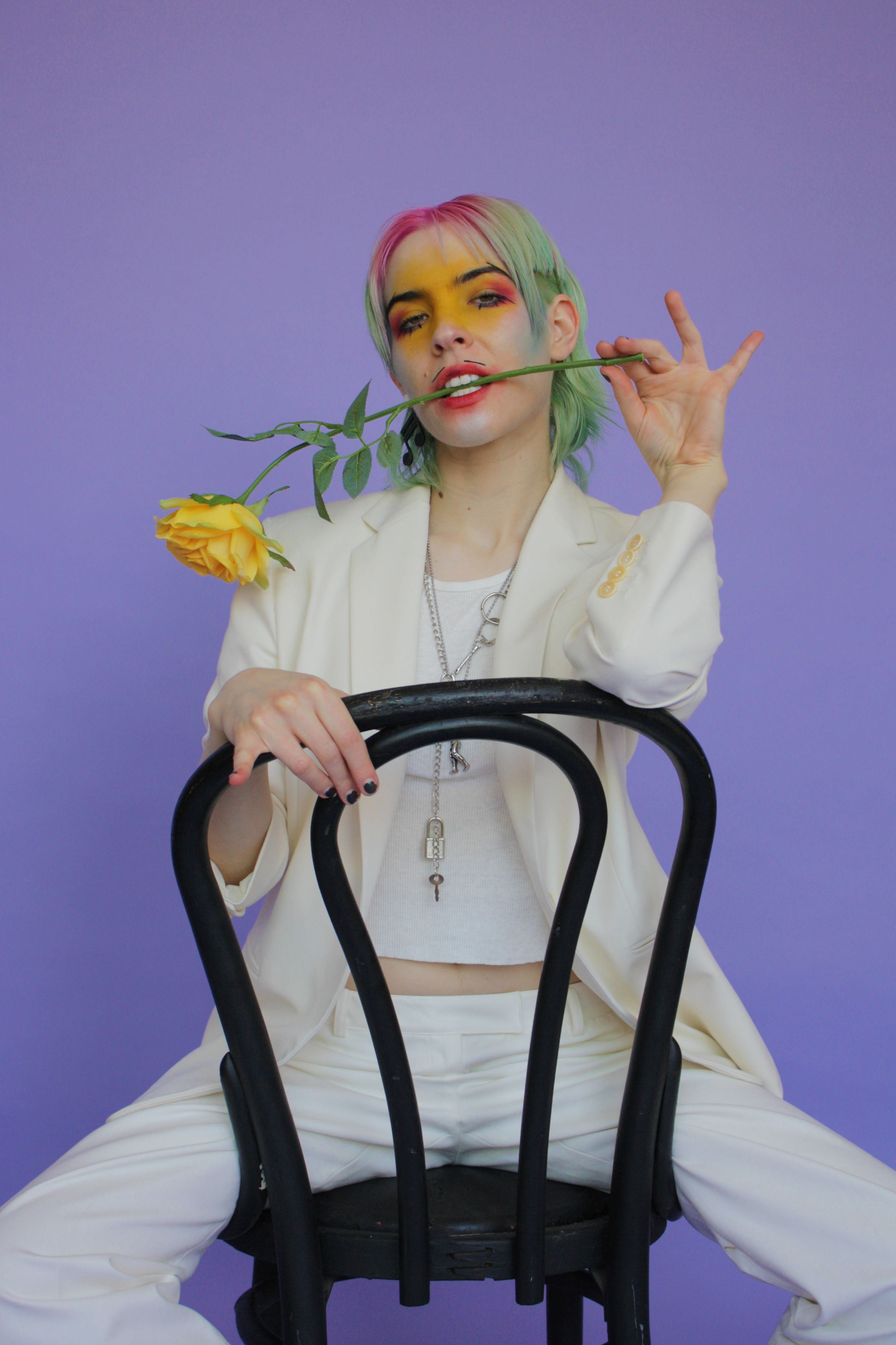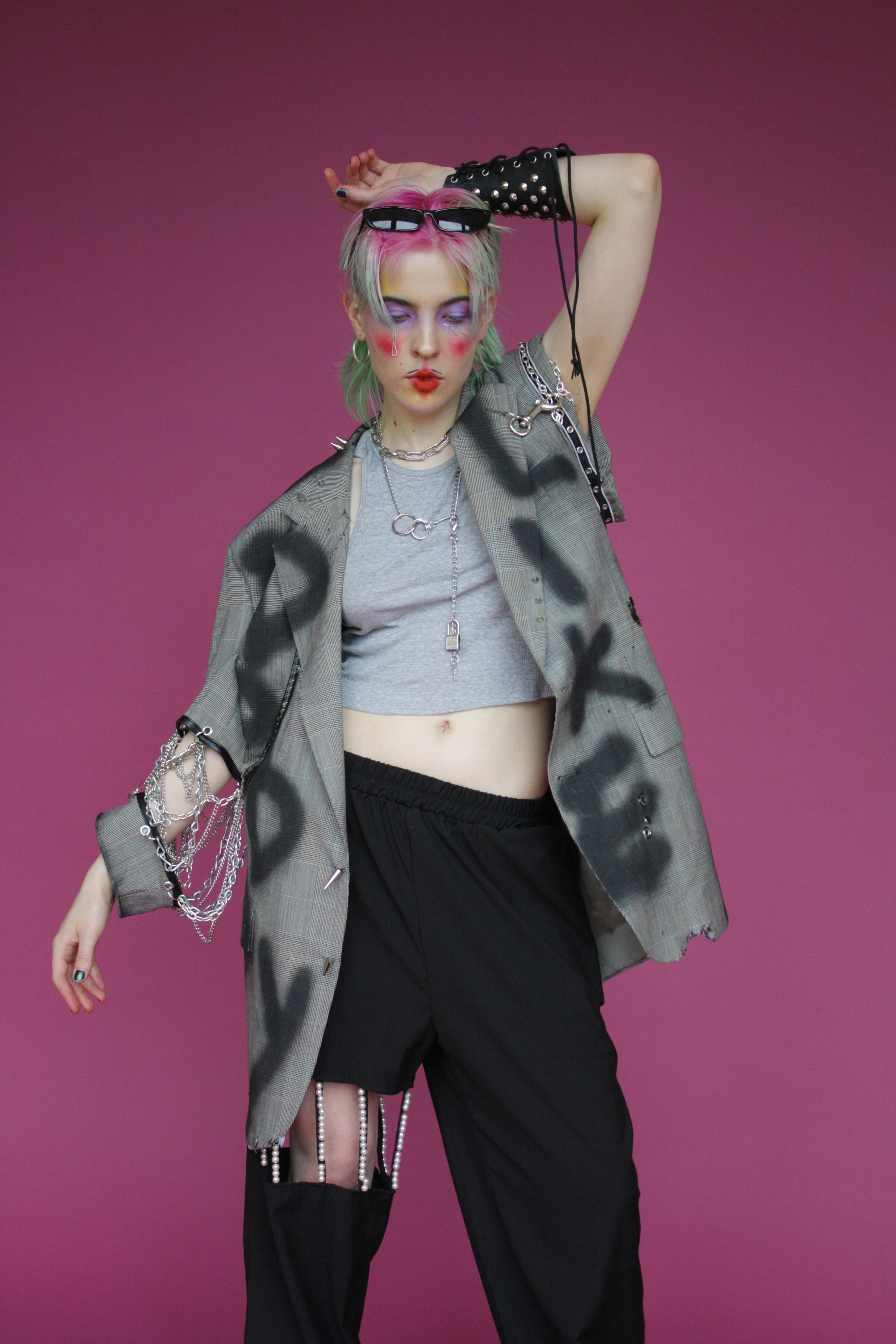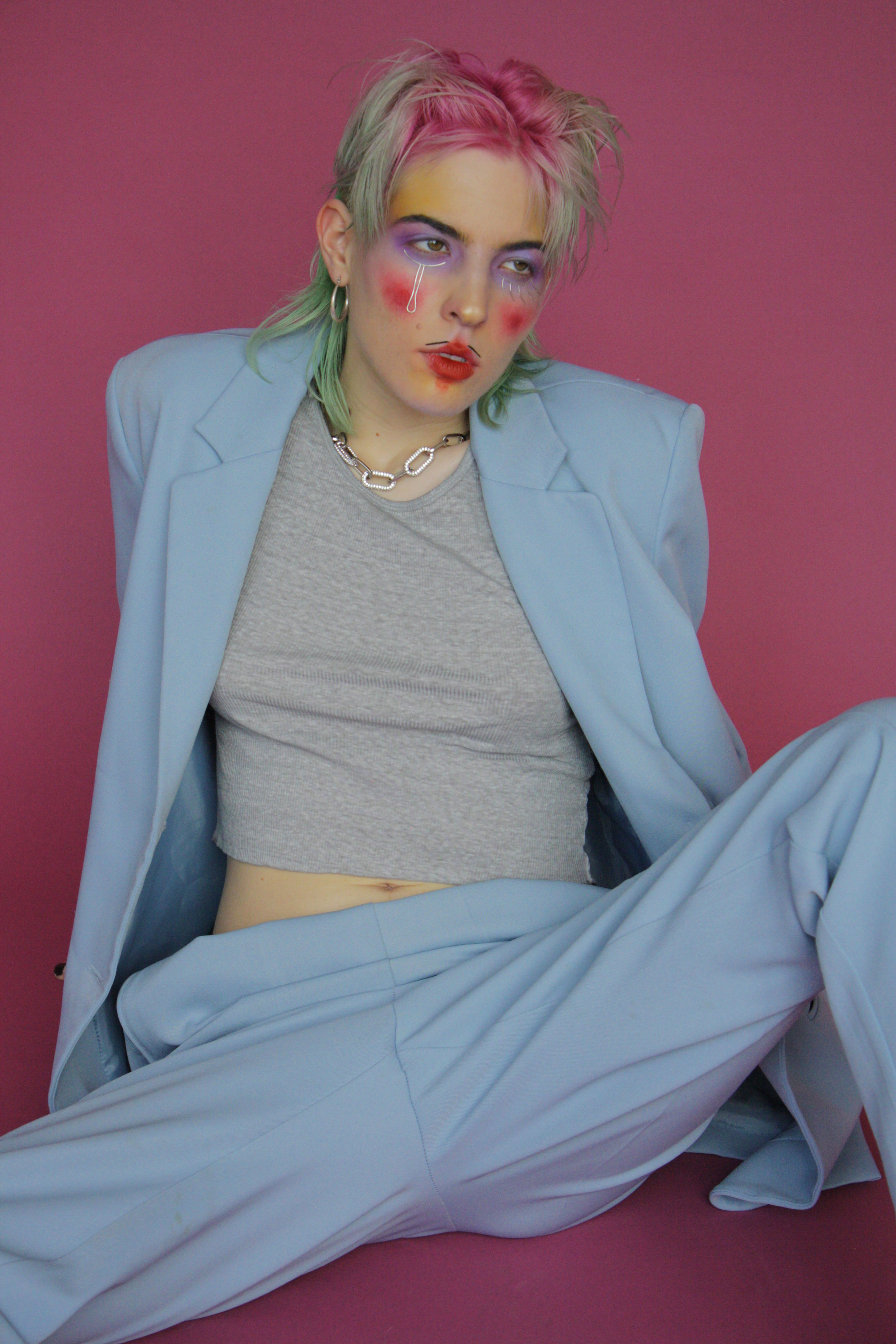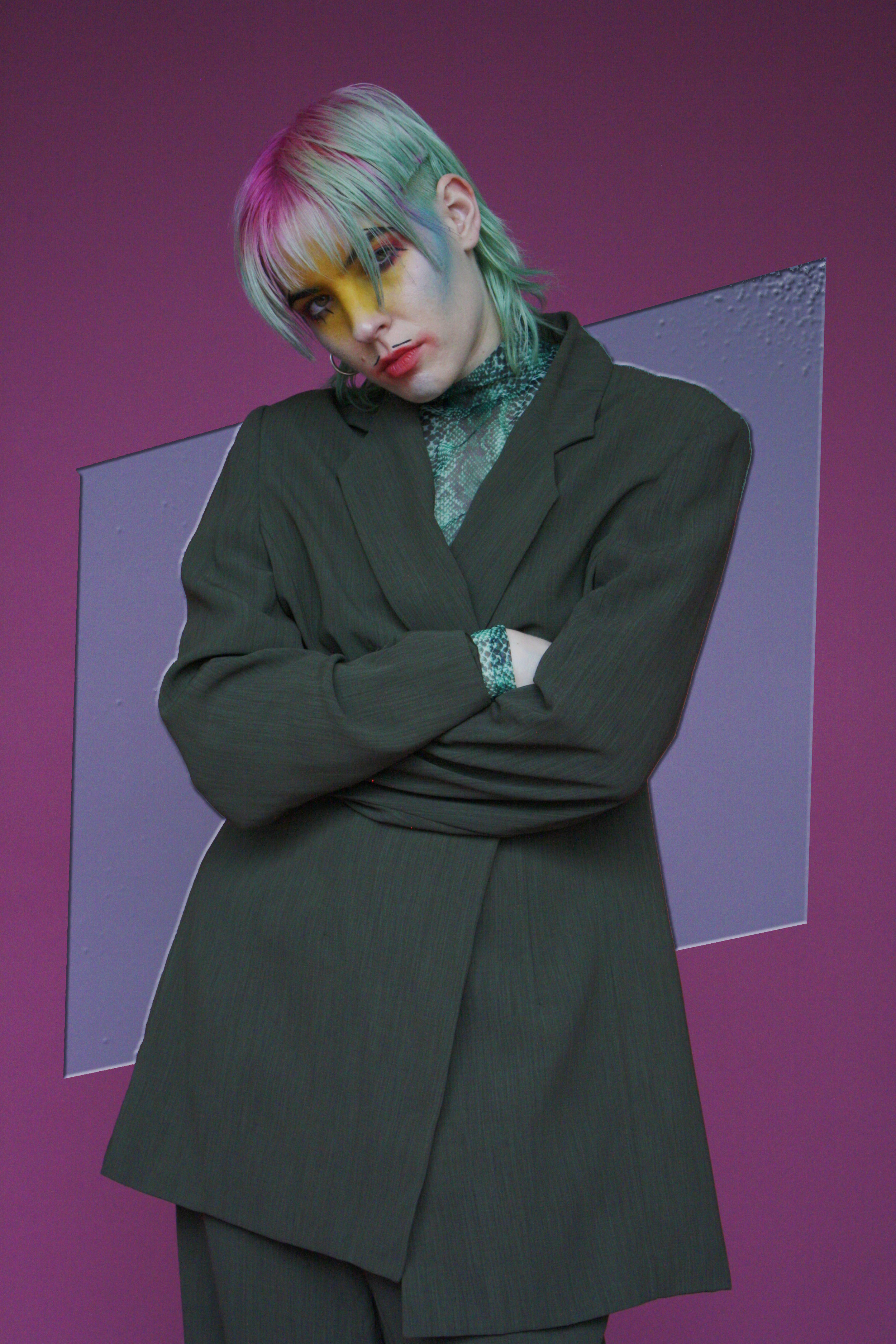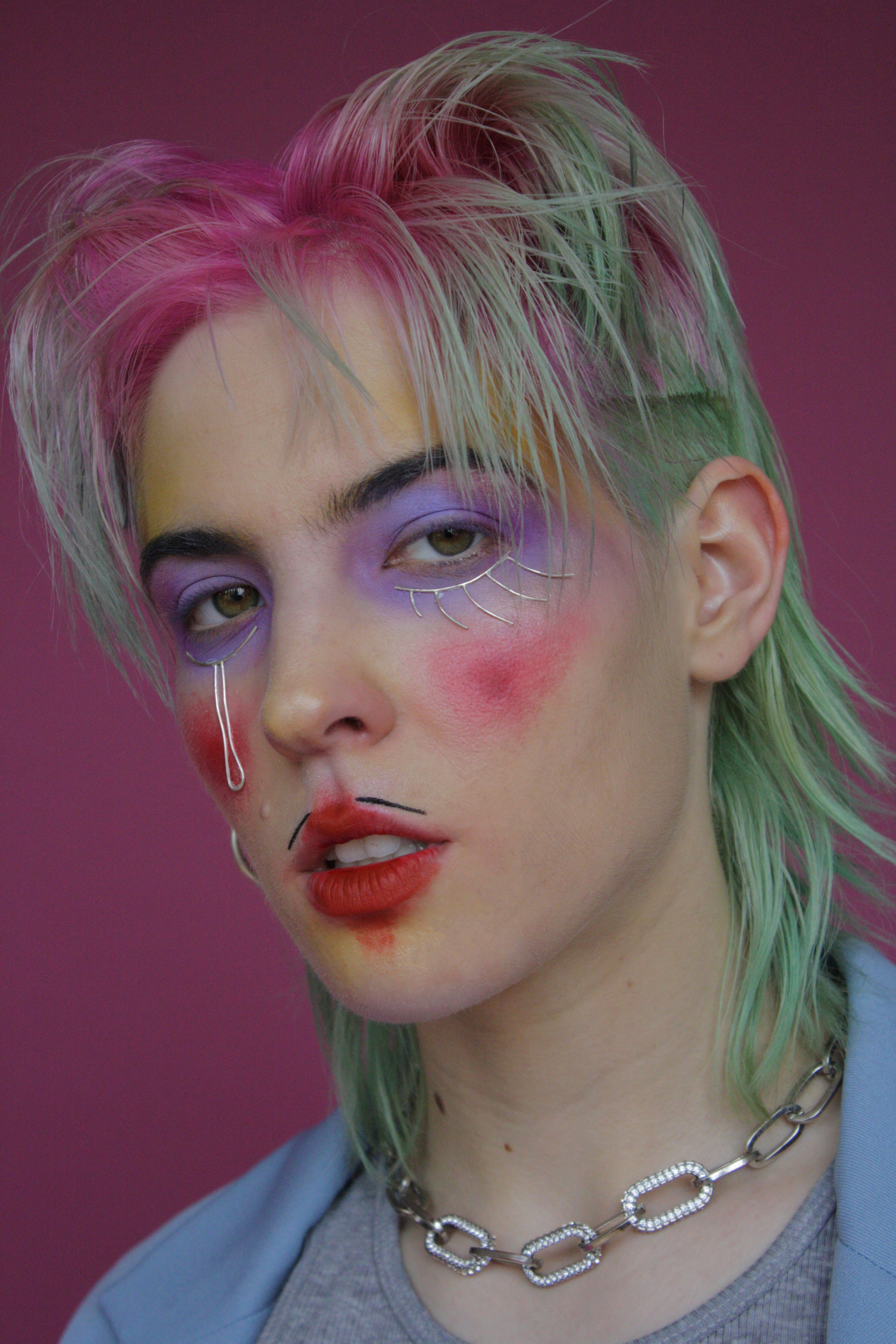Beyond Expectations, Dorian Electra
Photography by Hannah Siegfried
Photography: Hannah Siegfried
Interview: Michelle Varinata
Makeup: Hel Boyer
Styling: Ryne Norton
Production: Hannah Black
Originally published in IN Digital Cover, SS 2019
Dorian Electra cannot be summed up with an easy quip. Using music by all means to broaden minds, the 27-year-old gender fluid, rising pop star defies norms, stereotypes, and expectations.
Born and raised in Houston, Texas, Electra has since built up an exhilarating career trajectory: touring with Russian feminists protest punk rock band, Pussy Riot, and collaborating with avant-pop star, Charli XCX.
We first met about three years ago at the opening of multimedia artist, Signe Pierce’s gallery exhibition hosted in New York City. Now, we come together again over the phone ahead of the release of their debut album Flamboyant to discuss growing up in a gender-free household, their relationship to all things flamboyant, and killing the homophobes with kindness.
Michelle Varinata: How does it feel to be on the rise?
Dorian Electra: I’m so grateful to have had worked with amazing artists since I played with Pussy Riot. I also opened for Rina Sawaywama last year. It’s been great to meet their fans and get them to listen to my music. To support them has been pretty awesome.
MV: I’m so happy to hear [that]! How did these opportunities happen?
DE: With Pussy Riot, I actually met Nadya Tolokno through this person that interviewed [us] for a documentary about the clitoris. They thought it would be cool to connect us [because] Tolokno was into our videos. We started talking and then, over a year later, she was like, “Hey, I’m going on tour. Do you want to open for me?” I was like, ‘Yes, definitely’ and that’s how that happened. We’re still close which is awesome.
MV: What about Charli XCX? How did the opportunity for you to connect with her happen?
DE: I met this producer [A.G. Cook] who works with her a lot and I [also] did a session with him. He recommended me to Charli to be featured on “Femmebot” and that’s how that happened. I’ve already been a fan of Charli’s work for a while, so that was really cool to get to work with her.
MV: It’s insane how both of you are the same age and have a huge online fanbase.
DE: Thank you! It’s been really cool to watch it grow these past couple of years, especially with the non-binary and queer community. I feel like more and more people reach out and connect with me. That has always really encouraged me [to] keep on wanting to make music.
MV: Are you planning to feature anyone on Dorian Electra One?
DE: Well, I’m actually not doing any on this album though I do want to do a project with a lot of features after. I’m definitely going to be playing shows. I kinda wanna engage with the community and do an after-party. I’ve been doing with that with some of the shows Charli XCX and I have done where I’ve curated them with local drag queens and other local queer pop performers [throwing] a celebration in each place.
MV: Can you tell me about the most surreal experience you’ve had while going on the road and hosting parties?
DE: Charli and I were able to do a show at my mom’s ex-girlfriend’s lesbian bar [laughs]. We did a show/party and it was so crazy that this person started swinging from the rafters right above the stage then fell into the crowd. Thankfully, nobody was hurt. My parents were both there and my little brother was there, too. The women who own it used to date my mom back when I was a kid. That was pretty surreal and I’m like, ‘Wow!’ Everything was coming in full circle. It was crazy. That was really fun.
MV: My goodness! I can’t imagine bumping into someone from your past.
DE: That was a really cool moment. I also had some old high school friends that came as well. It was a really fun and to [witness] the queer community in Houston grow. It was definitely not like it is now when I was going to high school.
MV: I remember you go by they. When did your realize that you didn’t want to identify as a man or woman?
DE: For me, I identify as gender fluid, so sometimes it’s a little bit more like loosey goosey. Sometimes I’ll feel like a boy. Sometimes I’ll feel like a girl. To me, those are kind of like moods. I guess I started to realize [this] when I was getting involved in the queer community and seeing that other people were going by them/they pronouns. I didn’t feel uncomfortable using she/he pronouns for a long time. I was also proud to represent myself as woman at that time, especially when I was getting more into feminism. I think it was gradual as I [continued] to grow. Getting back to [my] genderless roots as a kid and realizing that they/them feels more comfortable for me. It wasn’t like I woke up one day and all of sudden, call me them/they. [Some] feel like it’s inconvenient to ask other people to do it. It doesn’t have to be.
MV: I’m more surprised that it stemmed from your childhood.
DE: My parents gave me a gender neutral name and allowed me to dress however I want. I liked wearing my dad’s band t-shirts with sneakers and stuff. I wasn’t girly at all. A lot of the characters and things that I liked on T.V. were boys or SpongeBob SquarePants. I wasn’t raised in a way that was like, you had to be feminine, you know.
MV: Your parents are so ahead of time. I went to high school in Southeast Asia where basically everyone wasn’t ready to come out and things like this are considered taboo because most kids in my high school had parents who went to church. Did you feel that a lot of people have judged you differently when you were a child because you rejected a lot of norms on gender?
DE: I feel like I grew up in an open supportive environment. There was no separation of boys and girls. There were no gendered toys. I feel like everyone [was] treated like a kid.
MV: Having lived in Houston and Chicago, when did you decide that Los Angeles is the place, and does it ever feel competitive there?
DE: About a year ago. When I felt that it was time for me to take my music career a lot more seriously so that I could work with music videos, I was waiting to see which city would pull me the strongest in this direction. LA felt very natural after four years of traveling. I was like, ‘Alright, this is definitely the right time.’ [While] I do agree that [LA is said to be] very competitive, I feel like because I see myself as a part of (hopefully) a movement of queer artists trying to lift each other up, I find the community to be supportive and truly beneficial for us.
MV: I’ve been watching your music video for “Flamboyant” and to me, it’s different than most of your songs because you usually write them from the perspective of someone else. What made you take “Flamboyant” into a more personal direction?
DE: I would say all of my songs like “Flamboyant”, “Man to Man” and “Career Boy” are from a character’s perspective, but in a way, [it’s also] my own perspective. It’s a little more complex because my feelings come out in an exaggerated and interesting way. There are definitely parts of it that are about myself. I am flamboyant as an artist. I [also] see a lot of signs that tell me that I need to be cool … “you should be sexy”. It’s an ambitious statement to do what I want to do and I’m not going to tone it down. It’s also taking that character to the extreme and critiquing the character for being the center of attention.
MV: I think it’s an interesting philosophy to turn that on its head. I realize that “Career Boy” is where you address the issue of workaholic men and “Man to Man” is about toxic masculinity. With “Flamboyant”, you also put on a male persona where you could feel the vibe of Liberace, Prince and all these men who go OTT. I was just wondering, what made you want to start addressing issues of masculinity within your music?
DE: Those were the types of people whom I was most excited about dressing in suits and ruffled shirts (somebody) from the 1700s, Liberace, and all that. It was an expression on what I was feeling about masculinity. I’m still exploring [it] for myself as I integrate masculinity more into who I am. It felt like it was something that people weren’t talking about in that way. Where a lot of people were talking about femininity and [how] that conversation is ongoing, a lot needs to be learned from talking about masculinity. Sometimes you realize that all the reasons why you want to do something as an artist, a lot of it is subconscious.
MV: The one thing that hasn’t changed is the camp aesthetic rooted in LGBTQIA+ culture that mainstream culture is hung up on. Do you think that they are trying to exploit this phenomenon?
DE: I think it’s such a cool moment that a lot of people are talking about camp. I read a lot of articles on mainstream websites about it. Drag is an awesome opportunity to create a space for artists who are presenting multi-faceted meanings and aesthetics in our work that is sincere, ironic, embracing over the top-ness, and a critique of political and social norms. That’s really cool that it’s becoming mainstream to talk about these ideas. There’s definitely appropriation and exploitation of queer culture as well as the culture created especially by queer people and trans people of color. Especially with lingo like, “YASSS kween”, “slay”, “shade” and all these other terms. I know that there’s been some good conversation about that recently, too. On the one hand, it’s good for queer visibility, especially when money and things get involved [but] you have to be careful of not being exploited. The answer is to turn to queer artists of color and put them at the forefront. Give them the attention they deserve for creating the kind of cultural products that are being used and repackaged by mainstream culture.
MV: Do you feel that you have an influence on making that grow (in Houston)?
DE: I mean, I like to think [that] but I feel like a lot of it is due to the Internet. There’s a culture of queer pop music fans that exist [and] they have been able to connect and have a community online that expands beyond the boundaries of their geographical locations. I had a little bit [of it] with online forums when I was in high school. I had a few online friends that I met because we like the same music and stuff, then we became friends in real life. I relate to those kids about having a whole world of people to connect to on the Internet.
MV: That’s absolutely the magic of the Internet.
DE: Totally.
MV: I know sometimes the Internet can be pretty vicious, especially with trolls who have been commenting on your page.
DE: One of my favorite things to do is respond to somebody’s negative comment with something really nice, or try to understand where they’re coming from. Usually when I reach out and respond, a lot of people will engage in a civil way, even if we disagree. We can still have a productive dialogue about it. I like to comment [or] pretty much read every comment on the YouTube page [and] it takes a lot of time, but it’s important to create the kind of peace that I want in the comment section for my fans because a lot of them will share stories. I want to create a space where people can feel comfortable sharing ideas. People [also say,] “I don’t understand this. I don’t get how this person’s non-binary and gender fluid. What does it even mean?” That’s an opportunity for me to open up a conversation to challenge them or to help them understand something new. So I see it as productive.
MV: I see. I really do think that it’s so important to have a strong state of mind. So, what’s the number one tip for artists who don’t really know how to handle attention with negative comments?
DE: I thought I would be getting haters by now, but I’ve been very lucky. I have friends, who are other queer artists, especially male identify or cis male queer artist who get hate for a lot of reasons. People’s comments stem from people who have been hurt and so, if you reach out with kindness, a lot of times, you can turn the person into the opposite direction because they’re lashing out at you. They’re jealous of you for being this proud and out queer person. Maybe they haven’t been allowed to be that when they grew up. What you don’t want to do is lash back with extra mean or hurtful [comments] because it pushes them further away. There’s nothing to be gained from that, you know.
Coming to IN #8, Fall 2019
White Look:
Suit: Vintage Calvin Klein
Shoe: Vintage Playboy
Tank: Urban Outfitters
Chain: Cloina
Blue Look:
Suit: Vintage
Tank: Urban Outfitters tank
Shoe: Vintage Sketchers
Face Jewlery: Hel Boyer
Green Look:
Suit: Vintage Halston
Top: Cloina
Boots: Vintage
Black & White Look:
Blazer: Blair Goldman
Tank: Urban Outfitters
Sunglasses, Chain, Pants: Cloina
Boots: Vintage

